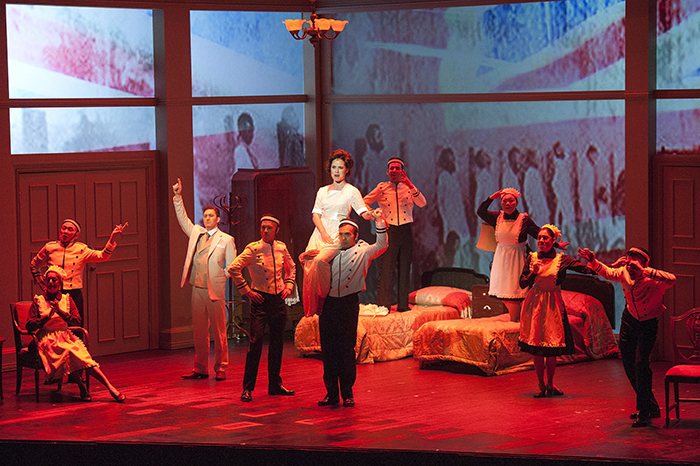Singapore’s arts scene finds inspiration in its tangled history with Malaysia
Wet Season (2019), the latest work by one of Singapore’s most decorated filmmakers, Anthony Chen, features an unhappy high school teacher, Ling, who forms a bond with one of her male students – a relationship that soon shades into more questionable territory. For her grounded, unvarnished portrayal, which offsets some of the film’s predictability and lack of narrative tension, lead actress Yeo Yann Yann won a Golden Horse, the Chinese-language film industry’s most prestigious award.
To me, what is more significant than the film’s exploration of female frustration and desire is the fact that Ling is a Malaysian Chinese (as is Yeo herself) who seemingly blends in with Singapore’s ethnic Chinese majority; and yet despite the two Southeast Asian countries’ proximity and shared history, and all her years of residing in the city-state, she remains an outsider.
Wet Season is one of a clutch of recent films and plays created by Singaporean artists that reflect wistfully on the country’s tangled relationship with Malaysia. These works appeared during key anniversary years in Singapore, such as last year’s marking of 200 years since the British first set foot in what would become their colony; and 2015, when Singapore celebrated SG50, or 50 years of independence as a nation-state. In 7 Letters, an SG50 anthology of short films, and in selected multilingual plays by Singapore theatre company Wild Rice, what is under scrutiny is not so much current bilateral ties, but the once-symbiotic historical relationship between the city state and its northern neighbour, which has since grown distant and transactional.
Wet Season, which hit cinemas at the end of last year, makes this point through the weather and through language. It’s always grey, rainy and depressing in the Singapore Ling inhabits, compared to the one Malaysian scene, which is flooded with sunshine, and she cuts an isolated figure as a Chinese-language teacher in a country where many ethnic Chinese don’t take the language seriously (English is Singapore’s language of upward mobility, whereas Malaysia has kept its independent Chinese-medium schools, and with that a base of Malaysian Chinese invested in the language). Then there is how she code-switches to Hokkien and Malaysian-accented Mandarin only when talking to her mother on the phone and to her brother, a truck-driving durian seller (Singapore once banned Chinese dialects from the mass media to encourage the speaking of standard Mandarin, and they remain officially frowned upon).
From 1963 to 1965, the two former British colonies of Malaya and Singapore, both multi-ethnic societies, were one country (along with Sabah and Sarawak) – until an unceremonious split. Malaysia went on to institute policies boosting economic and educational opportunities for the indigenous ethnic Malay majority, who today enjoy a privileged position. Singapore, faced with unease among Malays over an ethnic Chinese majority, born of over a century of colonial-era migration, actively promoted multiethnic representation and mixing in areas ranging from politics to public housing, but minority races have over the years also criticised the entrenching of ‘Chinese privilege’. The constant traffic between the two countries, similar in many ways yet also diametrically opposite, gives rise to the tensions highlighted onstage and in moving image. At the same time, the shared experience of decolonisation prior to 1963, with its sense of liberation and heady idealism, has also inspired artists bent on unearthing a lost limb of Singapore’s past that has been effaced by post-1965 state narratives.
One example is the bold 2015 epic Hotel, cowritten by noted Singapore playwrights Alfian Sa’at and Marcia Vanderstraaten, which Wild Rice is reviving this coming June. A cocktail of history and fiction spanning exactly 100 years, the play is set in a Singapore hotel room, where an energetic ensemble plays out different scenes, varying widely and at times jarringly in tone and style. One comic episode, set in the mid-1950s (before the merger with Malaya), has a starstruck Azizah from Penang bursting into the hotel room, where her hometown hero, the iconic Malay filmmaker P.Ramlee, is auditioning actors together with Indian director Phani Majumdar and movie mogul ‘Mr Shaw’, one of the famous Shaw brothers. Replete with song-and-dance sequences channelling Ramlee’s films, the scene is full of joie de vivre and harks towards the promise of a new nation in all its multiethnic plurality. This is in stark contrast to a later scene, in which a much older Azizah and her family arrive at the hotel as Malaysian tourists, amid post-9/11 security and anti-Muslim paranoia. The harsh interrogation of this Malay Muslim family by Singapore police officers conveys the walls that have sprung up – between countries and races – compared to a time when the borders were much more porous.

While Hotel may be criticised for romanticising an earlier era in Singapore–Malaysia relations, Wild Rice’s newer work has been more reflective and nuanced in its polemics. Alfian cowrote Merdeka, staged in October last year, with Neo Hai Bin. Despite its potentially didactic premise of a book club set up to dismantle the legacy of Stamford Raffles, the man framed by history textbooks as the ‘founder’ of ‘modern Singapore’, Merdeka ends up being akin to a very nimble, engaging lecture-performance. Deploying verbal cut-and-thrust, well-judged humour, Brechtian devices as well as emotionally resonant songs, the play brings to life lesser-known historical episodes in various ethnic communities’ skirmishes with colonialism. Its triumph must surely be leading the audience in a fist-pumping chorus of “Merdeka!” – the Malay word for independence, which closed Singapore founding father Lee Kuan Yew’s now-forgotten rousing 1963 speech announcing the end of colonialism and Singapore’s merger with Malaysia.
While these works dive into Singapore’s past, the object of concern is really the here and now. Beneath the nostalgia lies growing anxiety among Singapore’s liberals over a new generation of political leaders tightening the reins to establish their legitimacy, further shrinking the space for outliers and dissenters in universities, the media and the public sphere in general. These buried historical narratives matter because the lack of self-awareness and criticality will cost us, these artists say. They include documentary filmmaker Tan Pin Pin, who directed Pineapple Town, one of the fictional shorts in 7 Letters, about a Singaporean woman’s journey to trace the Malaysian birth mother of her adopted baby girl. As the terse one-liner at the end of Pineapple Town puts it: “We are what we know”.
Clarissa Oon is an arts writer and editor based in Singapore
First published in the Spring 2020 issue of ArtReview Asia
